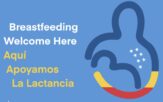At Breastfeed Durham, we realize that there are many parents who choose to exclusively express/pump (EE/EP) milk for their babies. EE/EP is increasingly common in our society, and it is the best solution for many people who want to feed human milk to their babies. EE/EP is still breastfeeding since it provides human milk produced by mammary tissue, to help baby grow and develop. Some parents intend to EE/EP from the beginning. Some parents transition from nursing at the breast/chest to exclusively feeding expressed milk via bottles. The reasons for this are numerous and may include physical or mental health concerns, difficult/painful latch and feeding, societal pressure, past trauma, or family circumstances. Some parents EE/EP milk for an adopted baby. Some parents feed a combination of expressed milk and formula. Every family has unique circumstances that factor into the decision about how to feed their baby. Every family deserves to receive appropriate, non-judgmental education and support, regardless of their chosen feeding method.
Overcoming Challenges and Bias
Expressing and feeding breast milk to a baby has its own challenges and joys. It can be very empowering and rewarding for a parent, knowing that they are providing optimal nutrition for their baby via human milk. Sometimes, though, people who EE/EP milk might experience negative feelings like guilt or disappointment, especially if their original intention was to directly breastfeed. Some outside observers might have negative thoughts about a bottle-feeding parent, thinking that they’re not doing the best thing for the baby if they aren’t feeding at the breast. Even the people who are trained to counsel and help people with breastfeeding sometimes demonstrate bias against parents who want to EE/EP; this can lead to inappropriate or inadequate advice to support the parent’s efforts. Unfortunately, this could result in a parent giving up on EE/EP, if they don’t feel that they are getting the support they need to develop and maintain an adequate milk supply to meet their feeding goals. If you are exclusively expressing/pumping, you are still breastfeeding. You are still providing human milk produced by breast tissue, and this will nourish and grow your baby. You are the expert on your family and your baby, and you should feel empowered to choose the feeding method that works best for you.
- Buddha Belly Birth Exclusive Pumping 101
- Kelly Mom -Exclusive Pumping
- Storing and Thawing Breast Milk/WIC Breastfeeding Support
- Life as an Exclusive Expresser – La Leche League International
- How to Keep Your Breast Pump Kit Clean – CDC
Protections for Employed Parents
The PUMP Act for Nursing Mothers was signed into law on Dec. 29, 2022. This law provides additional protections for employed people who are breastfeeding or pumping/expressing milk for their babies. Employers are required to provide designated space and time for employees who are pumping milk. This should increase the numbers of parents who will continue pumping at work, resulting in more babies continuing to receive human milk for longer periods of time.
Make a Plan
For parents who know that they want to EE/EP from birth, it can help to have a written statement in the birth plan to reflect this. The hospital staff could place a sign on the door or in the chart stating that the parent plans to exclusively pump, so that doctors, nurses, and lactation consultants will be informed ahead of time and can tailor their advice accordingly.
Seek Supportive Providers
If you are seeking lactation support to help with your EE/EP plan, look for providers who are supportive of pumping and can help optimize success. Look for resources like education about pumps and flange fitting, development of pumping plans to optimize milk production, and bottle-feeding techniques like paced bottle-feeding. Seek out a peer-to-peer support group for EE/EP parents if you want to connect with others who are pumping. Sharing stories and tips, learning from others, and being part of a community of people with similar goals can be very empowering! This kind of positive support can increase duration of, and satisfaction with, the lactation experience.
- Consider hiring a doula to assist you with advocacy during your next hospital stay.
- Consider a peer to peer support group for exclusively pumping parents.
Whether pumping is a part of a family’s feeding journey is an individual/family decision. We need to respect that autonomy and meet parents where they are, without judgment, in order to help them accomplish EE/EP in a way that creates success for them.

